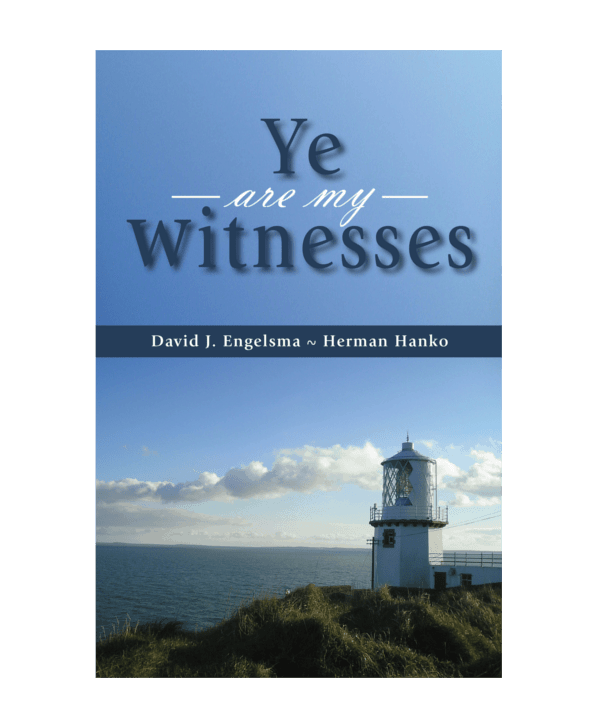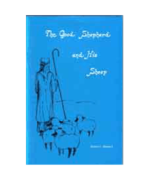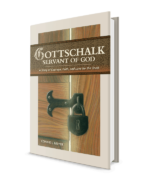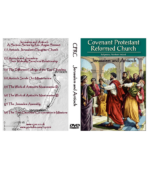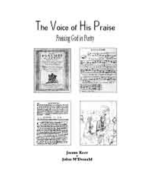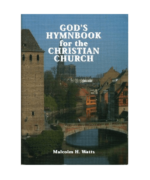Is it important that we witness? How are we to do it? What are we to say? What is our motivation and goal? Does the Bible have much to say about this subject? This new book, consisting of the speeches at the 2012 British Reformed Fellowship (BRF) Conference, gives scriptural answers on our vital calling as God’s witnesses.
—————————
“We desire that the one to whom we witness comes to share our hope. Our desire is not to win the argument, but to win the person. Our desire, if God will grant it, is not even simply to establish the truth, victoriously, beyond contradiction, shutting the opponent’s mouth, but to establish the truth in the soul of the one to whom we witness, so that also his mouth is opened to confess the truth with us …
In our witness, whether to an unbeliever or to an erring or weak brother, our purpose must be to gain and save him, if God wills. This will control the manner of our witness. This love for him will manifest itself in how we speak to him.
Such witness—truth in content, meekness and love in manner—God may use to gather and save His own to His glory.
What a motivation to witness!
What a motivation to witness properly!”
(David J. Engelsma, Ye Are My Witnesses, pp. 89, 90)
“I have enjoyed reading Ye Are My Witnesses, which I purchased recently. It is a great antidote to the Arminian idea of witnessing and I found the last chapter on mission work very helpful” – Middlesex, England
“Thank you for Ye Are My Witnesses which I received on Saturday. I am digging into it with ever growing appreciation …” –South Africa
CONTENTS
Foreword
Part 1
Chapter 1: The Divine Calling to Witness
Chapter 2: The Content of Our Witness
Chapter 3: The Official Witness of the Church
Chapter 4: Personal Witnessing by the Word
Chapter 5: The Personal Witness of a Godly Life
Chapter 6: The Manner of Christian Witnessing
Part 2
Chapter 7: By the Spirit of the Lord
Chapter 8: The Martyr-Church’s Witness to the Ascended Lord
Part 3
Chapter 9: Mission Work: Message and Methods
Appendix
About the British Reformed Fellowship 128
FOREWORD
The Bible is a book of witness. It is God’s written testimony to the world and it records the witness of His people to His glory, from the corporate witness of the worshipping church (Gen. 4:26) and the (largely rejected) preaching of Enoch (Jude 14-15) and Noah (II Pet. 2:5) before the flood, all the way to the book of Revelation penned by the Apostle John, who was exiled to Patmos “for the word of God, and for the testimony of Jesus Christ” (Rev. 1:9).
This witness is rich and varied, coming from God’s people of various backgrounds and ages, with both life and lip, to both believers and unbelievers, and highlighting different aspects of the character and salvation of the God of the covenant.
What a witness of faithfulness and contentment was Joseph who was sold into slavery by his brothers, slandered by his master’s adulterous wife and imprisoned for a crime he did not commit (Gen. 37; 39-41)! Moses and Aaron testified courageously to hard-hearted Pharaoh and his court (Ex. 5-12). The faith and works of the harlot Rahab in Jericho are a great witness (Josh. 2; Heb. 11:31; James 2:25-26).
Who can forget Ruth the Moabitess’ moving plea to her mother-in-law, Naomi?
Intreat me not to leave thee, or to return from following after thee: for whither thou goest, I will go; and where thou lodgest, I will lodge: thy people shall be my people, and thy God my God (Ruth 1:16).
Listen to the Israelites at the temple with their baskets of firstfruits, confessing with joy and gratitude that Jehovah redeemed them and gave them the promised land (Deut. 26:1-11). Remember the little Jewish girl’s word to Naaman the Syrian’s wife of God’s power to heal through His prophet Elisha (II Kings 5:3-4). The four young men from Judah were a fine witness to Nebuchadnezzar and his pagan court by their faithfulness to God’s law and diligence in studying (Dan. 1).
If anything, the theme of witnessing is even stronger in the New Testament. Think even of the earliest history contained in its pages: the Virgin Mary’s joyful witness to Elisabeth (Luke 1:46-56), the praise uttered by the formerly dumb Zacharias (vv. 67-79), the shepherds who spread abroad the things they had seen and heard on that marvellous night in Bethlehem (2:8-20) and the words of the “wise men from the east” to King Herod (Matt. 2:1-2).
John 1 repeatedly describes John the Baptist as a “witness” who “bare record” of Jesus Christ (vv. 7-8, 15, 19-20, 32-34; cf. vv. 26-27, 29-31, 36-37, 40). During His public ministry, the Lord’s followers witnessed of Him, such as, the man born blind, with quick-witted responses to His interrogators (9:24-34); Zacchaeus, the chief tax collector, by generous giving and restitution (Luke 19:8); the children in the temple, with praise to the Son of David (Matt. 21:15-16); and the penitent thief, with sharp rebukes of his fellow criminal and a beautiful request for inclusion in Christ’s kingdom (Luke 23:40-42).
The Lord Jesus, “the light of the world” (John 8:12; 9:5), came to earth to “bear witness unto the truth” (18:37), through his preaching, parables and miracles, as well as His conversations with individuals, such as Nicodemus at night (ch. 3) and the Samaritan woman at the well (ch. 4). It all climaxed with His atonement on the cross and the “good confession” that He “witnessed” “before Pontius Pilate” (I Tim. 6:13; cf. John 18:33-38). The women at Christ’s tomb testified of His amazing resurrection on the third day (Matt. 28:1-10).
Especially after the outpouring of the Holy Spirit at Pentecost (Acts 2), the apostles were witnesses of the risen Lord (1:22; 2:32; 3:15; 4:33; 5:32), as Christ had earlier promised (John 15:26-27; Acts 1:8). Acts is a book of the witness of the early church by apostles, prophets, evangelists, pastors, elders, deacons and believers; faithful Jews and Gentiles; young and old—often reviled and persecuted but always victorious in Jesus Christ.
Sometimes, the testimony to the Lord Jesus was made in legal settings, especially by Paul in his various trails before religious and civil rulers (chs. 22-26). This even took him to Rome itself, for he appealed to Caesar (25:11, 21, 25; 26:32; 28:19).
Not only do the holy angels witness to saints on many important occasions in the Bible, but also the sufferings of the apostles (and even of the church) are “a spectacle” to angels (I Cor. 4:9).
Thus we are surrounded by a great “cloud of witnesses” (Heb. 12:1), consisting not just of Old Testament believers (e.g., ch. 11) but also of children of God in the New Testament Scriptures and even of Christians in the two millennia of the post-apostolic church.
Like many other parts of the world, the British Isles has a noble history of witnessing, including Saint Patrick in fifth-century Ireland; John Wycliffe, the fourteenth-century English pre-Reformer; Bishop Robert Ferrar, martyred in Carmarthen, Wales, in 1555; and the great sixteenth-century Scottish Reformer, John Knox.
Add to this the godly pastors, profound theologians, faithful missionaries and vibrant Christians whom God has raised up in these islands to testify of His rich saving truth at home and abroad, and summarized in the gospel promise:
That if thou shalt confess with thy mouth the Lord Jesus, and shalt believe in thine heart that God hath raised him from the dead, thou shalt be saved. For with the heart man believeth unto righteousness; and with the mouth confession is made unto salvation (Rom. 10:9-10).
All of this stands in sharp contrast to the development of “the mystery of iniquity,” which has been working for two thousand years (II Thess. 2:7) and which will culminate in the Man of Sin and his big lie, for he “opposeth and exalteth himself above all that is called God, or that is worshipped; so that he as God sitteth in the temple of God, shewing himself that he is God” (v. 4; cf. Rev. 13:6). Yet, most will follow him and perish in God’s just judgment of them for their not receiving “the love of the truth” (II Thess. 2:9-12; cf. Rev. 13:3-8).
The British Reformed Fellowship (BRF) seeks to increase and strengthen godly witnesses and true witnessing in the British Isles and further afield by the grace of the Holy Spirit. To this end, the BRF organized its twelfth biennial Family Conference in Lorne House, by the north coast of County Down in N. Ireland with the theme of “Ye Are My Witnesses” (28 July – 4 August, 2012). Now the BRF has published this excellent material in the book you are reading. The cover photo is of Blackhead Lighthouse on the east coast of County Antrim, to which a number of Lorne House conferees walked during one of the day trips.
Part 1 consists of the six main lectures by Profs. Herman Hanko and David Engelsma, dealing with the calling, content and manner of our witness, both of the official witness of the church and the personal witness of the believer by word and life. Since the two Sunday sermons by our two main speakers developed aspects of our great theme, they are included in Part 2.
Part 3, “Mission Work: Message and Methods” by Rev. Martyn McGeown, gives a concrete and practical application of the biblical teaching on witnessing from one man in one missionary work, the Limerick Reformed Fellowship. This originally constituted the special lecture at the 2012 BRF Family Conference and is included especially for the instruction and encouragement of others involved in mission work or small churches.
Ye Are My Witnesses is the fifth BRF book co-authored by Profs. Engelsma and Hanko, the others being Keeping God’s Covenant (2006), The Five Points of Calvinism (2008), The Work of the Holy Spirit (2010) and The Reformed Worldview (2012).
I hope you read this latest BRF book prayerfully, and that it stirs your soul to witness more faithfully. May the truth of God’s Word, set forth here, resonate in all our hearts: “Ye are my witnesses” (Isa. 43:10)!
Rev. Angus Stewart
BRF Chairman
This book can also be read on-line.
This book can be read on-line in Hungarian.
Book Review
Ye Are My Witnesses
David J. Engelsma & Herman Hanko
British Reformed Fellowship, 2014
How can churches grow in these days? This question was raised by members of the British Reformed Fellowship, and answered from Scripture by the speakers at the 2012 British Reformed Fellowship Ulster Conference. the addresses given have now been collected and edited into this important little book, and made available to a wider audience.
Professors Engelsma and Hanko show that in all ages the church has grown by three means: a) from within as covenant children are born and raised by believing parents within the church, b) by the witnessing of believers, and c) by evangelism. this is the balanced pattern of the Bible, and thus church members play a vital role as witnesses: a point enforced from Scripture in the nine chapters of this book.
These chapters cover “The Divine Mandate to Witness,” “The Content of our Witness,” “The Official Witness of the Church,” “The Personal Witness of a Godly Life,” “The Manner of Christian Witnessing,” “By the Spirit of the Lord,” “The Martyr-Church’s Witness to her Ascended Lord,” and “Mission Work; Message and Methods.”
We are shown that witnessing is a divine mandate for all believers, but when and where is not our choice: God brings about the opportunities. What we witness is also not our choice for Scripture has many warnings about false witnessing. God’s Word provides the message. Believers must never be tempted to “leave evangelism to the professionals.” All are required to study the Word, and be ready to explain and defend their faith at any time. The core message is always to be the proclamation “Jesus is Lord” and there must be an emphasis on the Law (10 Commandments) as God’s rule for life on earth. The visible church must have a stated, confessional, doctrinal stance, should ensure that this is as Scriptural and God-honouring as possible, and must faithfully hold to it. This is the on-going witness of the organised church. Words can soon be forgotten: a consistently Christian life, distinct from that of the world, is a powerful witness. Witnessing must be in love, meek when called for, but bold and uncompromising when the truth must be defended. Witnessing will inevitably also raise opposition. Faithful witnesses are never alone: they are supported by the Holy Spirit. “Witness” and “martyr” are interchangeable terms. It is very possible that in the near future there will be an ever heavier price to pay for witnessing for Christ in word and life. These issues are also in the sovereign hands of God, but we must be prepared to stand faithfully until Christ returns.
The final chapter, “Mission Work: Method and Message” by Martyn McGeown, is a challenging and encouraging narrative of missionary church planting in Limerick, Ireland.
… [It] presents material from a Scriptural basis that all concerned Christians would do well to ponder and pray over. A wide circulation of this book would do much good.
(British Church Newspaper, 12 June 2015)
To order in N. America, please contact Crete Protestant Reformed Church, Crete, Illinois

